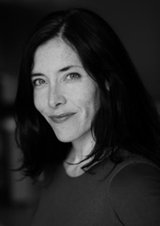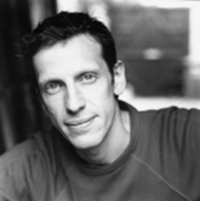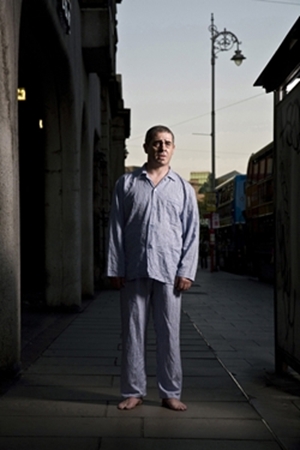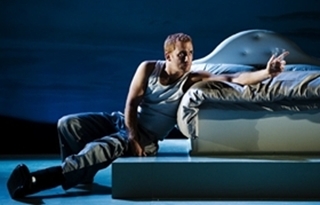Corn Exchange are back in the Ulster Bank Dublin Theatre Festival for the third time in four years with Freefall. In the fourteen years of its history, there are certain characteristics that we have come to expect from Corn Exchange’s work: a highly physical style of performance, unusual juxtapositions of theme and formal approach, and above all, a focus on the relationship between stage and audience. But there is always an element of the unknown about any new Corn Exchange project, which is part of its appeal.
KAREN FRICKER (KF): What was the genesis of this project?
 ANNIE RYAN (AR): The Arts Council had told us that we couldn’t spend another year without being in production. So we started to focus on what our favourite bits in Everyday [their 2006 Dublin Theatre Festival production] were, which were the moments of transformation, like when Mark O’Halloran walked into a refrigerator and emerged out the other side into a supermarket. We decided to work on this idea of theatrical transformation as our starting point.
ANNIE RYAN (AR): The Arts Council had told us that we couldn’t spend another year without being in production. So we started to focus on what our favourite bits in Everyday [their 2006 Dublin Theatre Festival production] were, which were the moments of transformation, like when Mark O’Halloran walked into a refrigerator and emerged out the other side into a supermarket. We decided to work on this idea of theatrical transformation as our starting point.
We narrowed the focus down to one character, played by Andrew Bennett, with the other actors playing multiple characters. Now we are trying to make this strange play connect to the audience. The story moves around in time and we have to help the audience with these temporal shifts – to know why we’re flashing back. We almost have it now, I hope.
 MICHAEL WEST (MW): We were interested in the transformative grammar of storytelling, in dramatising the hinge points of leaving a scene and entering a scene. Dublin by Lamplight [their hit 2004 production] had very clear transitions, but we liked the idea of keeping people on the stage for longer.
MICHAEL WEST (MW): We were interested in the transformative grammar of storytelling, in dramatising the hinge points of leaving a scene and entering a scene. Dublin by Lamplight [their hit 2004 production] had very clear transitions, but we liked the idea of keeping people on the stage for longer.
At first I wanted to do something about a primary school teacher who was obsessed with the moon. Then we had an idea about a doctor who was very fit. And then we found, on ted.com, the story of Jill Bolte Taylor, a brain researcher who studied her own experience of having a stroke -- an amazing story. So this idea of someone having a stroke became an idea...
This is how we work, how we move. Organic is such an overused word; it’s like a slow mutation over time. You just keep on answering questions.
AR: It’s been a wild and intense summer. The silly thing is that this is really a three-year process; that is what material like this really needs in order to develop properly. We have been through this with Everyday and Dublin by Lamplight, and it’s stressful. There may be directors who can see something in their head – who can imagine what a production is supposed to look like, but I am not that creature. I need to have people in the room; I need people to run around in a space. It’s about giving them the tools to stage it themselves, nearly. Working within an ensemble model is what I love.
That being said we do have, by current Irish standards, a long rehearsal period, which is great, and a fantastic cast; we do crazy things like yoga for an hour every morning, and they are up for it. It feels like we are a company again, which is wonderful.
KF: If you were to try to sum up the subject matter of this piece...?
AR: It’s about a man who’s about to die and what that might feel like. The character is so passive, which may be about what Ireland has been like about its own history.
KF: So are you trying to make a direct comment about Ireland today?
AR: All this may be easy for me to say, not being from here [Ryan was born in Chicago and moved to Ireland in the early 1990s]. But during the Celtic Tiger and that crazy ten-year party, it’s as if people were saying ‘we’re not like that anymore’. Everyone had an insatiable desire for the best of everything – we were all part of that, we all have excellent taste now. But there was a sense of denial about the atrocious things that were going on under people’s noses. Now, between the Ryan Report and the failing economy, everyone has been on their knees this year. And it’s unfortunate that no one in power has been able to step up and say ‘what are we doing, what have we done?’ People have to grieve. We have been thinking about this and talking about this a lot. In a way this show is about grief, grief for not having done anything.
 The main character is so passive: he hasn’t tried to find his missing sister - or he’s not tried hard enough – and he has a sort of tragic past that he hasn’t dealt with. He’s been a very agreeable man; he’s done what he’s been told. There is something deeply aggressive underneath his passivity though.
The main character is so passive: he hasn’t tried to find his missing sister - or he’s not tried hard enough – and he has a sort of tragic past that he hasn’t dealt with. He’s been a very agreeable man; he’s done what he’s been told. There is something deeply aggressive underneath his passivity though.
MW: The play came out of sense of loss. We feel there is a sense of crisis and anxiety in the country, a sobering energy, and we wanted to incorporate this. We feel as if that energy is in the room, from an audience point of view. You don’t have to point out the obvious; everyone is aware of it. There is a balance between respecting the audience’s intelligence and provoking them into a new awareness.
KF: Have there been any particular art works or ideas that have inspired the piece?
AR: This is really a grown-up piece for us; at the heart of it is a marriage that is failing. We are great fans of Richard Yates and one of our early inspirations were his short stories, really heartbreaking pictures of couples in marital hell. Musically, I still do love Arvo Part. Conor [Linehan] has just started composing the music and I think it will feel really contemporary.
I saw a production of Mourning Becomes Electra directed by Ivo Von Hove for Toneelgroup Amsterdam, last year in Chicago. I had never seen contemporary theatre, with video and sleek sets and a really amazing ensemble company coincide quite so well. We’ve also been looking at a Turkish movie called Climates by Nuri Bilge Ceylan, which is about a married couple, and it’s very still.
The other thing that I am obsessed with at the moment is the notion that you can not just change the way your mind works but that you can make yourself happier. I have been reading and thinking a lot about happiness, Buddhism, and meditation, and that is definitely a big underpinning of this piece: that notion that you repeat patterns, particularly when it comes to marital breakdown stories.
But the question is: how can you get out of your own patterns of thought? I want to believe the Buddhist thing that our ego is an illusion and that the next moment is available to you.
Of course the Celtic Tiger was going to end; how naive that we thought otherwise. But I’m not interested in giving a message to Ireland; this is just what I think. I hope the piece isn’t going to be preachy. I hope people can feel something and hold on to that uncomfortable feeling of not knowing what happens next.
And the core of our work is about that stuff. If you’re going to walk, walk; if you’re going to stand, stand. Don’t just say the line because they guy wrote the line. This is the heart of the work: I am trying to encourage people not to know what is in the next moment, to take strong action by embracing what they discover.
KF: Will the production be in the recognisable Corn Exchange style, with the mask make-up and percussion and delivery of lines directly to the audience?
AR: The style for this show is a departure, and for people who have seen our work it may be a surprise. We’re following our noses, saying ‘it should feel like this, so maybe we should try that...’ The grammar we are trying to find theatrically is linked to the text. We’re not there yet. We’re following an idea rather than trying to force something on something.
KF: Your last show was a Tennessee Williams, done in the commedia style. What was that experience like?
AR: With Cat on a Hot Tin Roof, we were very compromised. We wanted to do something very Corn Exchange but we were not allowed to cut the text, and you really can’t do a two and-a-half-hour play in commedia with those long monologues. It divided people critically. I find that whenever you work in naturalism, the actor’s body slumps, but if you keep it in the commedia style, they are more alive and on their feet. With Cat, I found that when they weren’t in the style they tended to be leaning on the furniture. But eventually I took the commedia style out, after it had been reviewed.
KF: Why did you change it only then?
 AR: I had meant to try it in preview, in Bray, but we ran out of time and at a certain point you have to stop experimenting. So I took it out in the second week of performances. I think the actors were happy to look at each other again! And I think it was better because the direct address was confusing alongside the commedia style, and we also never really had as much sound design as we had hoped for. Once I took it out, the shadow of the style still remained, and helped to deliver key moments. It’s unfortunate that I opened it without having finished it.
AR: I had meant to try it in preview, in Bray, but we ran out of time and at a certain point you have to stop experimenting. So I took it out in the second week of performances. I think the actors were happy to look at each other again! And I think it was better because the direct address was confusing alongside the commedia style, and we also never really had as much sound design as we had hoped for. Once I took it out, the shadow of the style still remained, and helped to deliver key moments. It’s unfortunate that I opened it without having finished it.
KF: Your last three shows have premiered in the Dublin Theatre Festival. Have you found that to be a good context for your work?
MW: Well, you’d want to be seen in an international context. The challenge is of course that if you’re doing something new and untried and you’re being held up against the best of world theatre. But as a producer Loughlin [Deegan] has been very open and positive: he says: do what you want to do, go ahead. That kind of hospitable energy is very nice.
KF: What’s next for Corn Exchange?
AR: We want to continue to make original work, and also do adaptations. We want to follow the strongest players we have. We really did pursue this piece with Andrew [Bennett], Louis [Lovett], and Janet [Moran] in mind and are working to suit their particular talents: meaty emotional stuff for Janet, transformational stuff for Louis, and stillness for Andrew.
The core is the group, to try to make the ensemble strong, and make the physical language better. I am a tragedian at heart but we work with some funny, funny people. And I would still love to do Guys and Dolls someday...
But who knows what’s going to happen with the Arts Council. It’s really serious. But I don’t want to get into a situation... I would rather close the company than be told, ‘this is how you do this’. The idea that you have to deliver a show every year ... original work takes longer. If we do a play, that’s our development money gone. If you want to develop new work you need serious investment. We are using a lot of technology in this one, and getting our players in the room costs serious money. But we feel privileged to be in a room with them.
Freefall opens at Project Arts Centre, Dublin, on Wednesday, October 7th. See www.dublintheatrefestival.com
Karen Fricker is a lecturer in contemporary theatre at Royal Holloway, University of London and deputy London theatre critic for Variety.